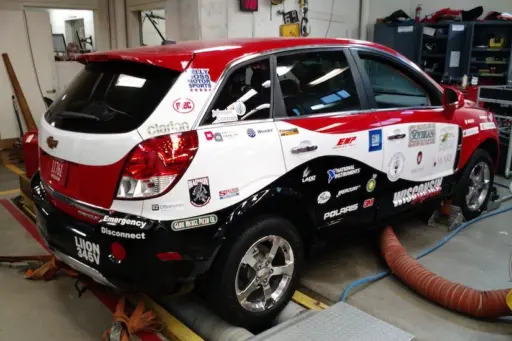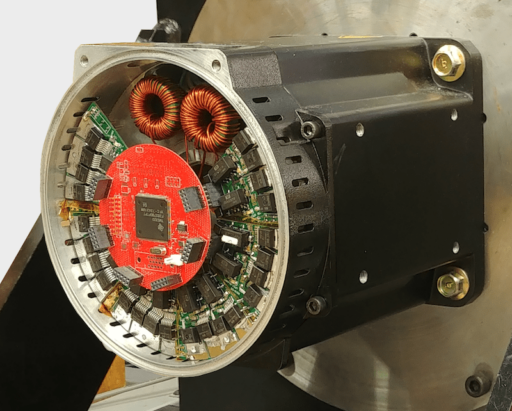University of Wisconsin-Madison engineers are leading an extensive research effort that aims to enable innovative propulsion technologies for future U.S. Army air and ground vehicles.
 David Rothamer
David Rothamer
With an $11.5 million cooperative agreement from the U.S. Army Combat Capabilities Development Command’s Army Research Laboratory, the multi-institutional team will conduct fundamental research that paves the way for hybrid-electric engines capable of running effectively on a variety of fuels.
“While there has been a lot of work done on developing hybrid-electric engines for ground vehicles, like the Toyota Prius and many others, there hasn’t been much research on using hybrid engine systems in aircraft,” says David Rothamer, the Robert Lorenz Professor of Mechanical Engineering at UW-Madison and principal investigator for the project. “So as part of this project, we’ll work on optimizing hybrid systems for aircraft.”
A big focus of the project will be to investigate ways to enable these hybrid aircraft systems to run reliably and stably on different types of fuel and in extreme environments.
Currently, the military needs to transport jet fuel to locations around the world to conduct missions, which is expensive and logistically challenging, especially in conflict zones. Having the ability to run an aircraft on whatever type of fuel is readily available locally—be it diesel, jet fuel, gasoline or even ethanol—would greatly ease the fuel logistics burden for the Army.
 A hybrid-electric vehicle with a customized engine and electric drivetrain developed in conjunction with work in the Engine Research Center at UW-Madison. As part of the U.S. Army project, the researchers aim to optimize a similar type of hybrid system for use in aircraft. Submitted photo.
A hybrid-electric vehicle with a customized engine and electric drivetrain developed in conjunction with work in the Engine Research Center at UW-Madison. As part of the U.S. Army project, the researchers aim to optimize a similar type of hybrid system for use in aircraft. Submitted photo.
Compression ignition engines, which are well suited for unmanned aircraft systems, require fuel that ignites easily for combustion to occur. However, lower ignition quality fuels such as gasoline, ethanol and even jet fuels made from renewable sources don’t easily ignite in compression ignition engines. They’ll need some help to start the combustion process.
To solve this challenge, the team will study a combustion technique called energy-assisted compression ignition, which shows promise for giving those fuels a boost and thus enabling multi-fuel capability. “With these low-quality fuels, when the fuel is injected, it’s not going to burn,” Rothamer says. “So we’ll need to assist that ignition process by bringing in some additional energy. The team is investigating the most effective and efficient method of introducing that energy.”
In addition, the researchers will analyze the benefits and tradeoffs involved with adding electric technologies to the propulsion system. For example, integrating electric machines could open up new capabilities—such as electrically assisted turbocharging—but they also require energy storage and additional components, which add weight and complexity to the system.
“We’re focusing on establishing a scientifically based modeling structure that allows us to conduct design studies, understand the tradeoffs and ultimately design a prototype system we can test and validate,” Rothamer says.
 An integrated motor drive developed by WEMPEC faculty combines the electric motor and required drive electronics in a single package offering potential for improved density and reduced weight. The U.S. Army-funded work will explore using and optimizing integrated motor drives for hybrid-electric aircraft applications. Submitted photo.
An integrated motor drive developed by WEMPEC faculty combines the electric motor and required drive electronics in a single package offering potential for improved density and reduced weight. The U.S. Army-funded work will explore using and optimizing integrated motor drives for hybrid-electric aircraft applications. Submitted photo.
This project leverages the considerable expertise of UW-Madison engineering faculty from both the world-renowned Engine Research Center (ERC) and the Wisconsin Electric Machines and Power Electronics Consortium (WEMPEC), as well as several partners from universities across the Midwest and Argonne National Laboratory.
“It’s exciting that this project brings together a large team of people with a wide range of expertise to tackle a really challenging problem,” Rothamer says. “Essentially, we’re doing the fundamental research for industry, with the Army Research Laboratory helping to transfer our scientific advances to real-world applications.”
The ERC collaborators, all faculty in UW-Madison’s mechanical engineering department, are Grainger Professor of Sustainable Energy Jaal Ghandhi, Associate Professor Sage Kokjohn, Professor Scott Sanders, and Associate Professor Mario Trujillo. From WEMPEC and the electrical and computer engineering department, Grainger Professor of Power Electronics and Electrical Machines Tom Jahns and Assistant Professor and Grainger Institute Fellow Eric Severson will contribute to the project.
“Collaborative research partnerships between the Army, academia, and industry are crucial to achieving our mission,” says ARL Central Regional Lead Mark Tschopp. “The University of Wisconsin-Madison is bringing subject matter experts, unique facilities, and great students in multi-fuel capable hybrid-electric propulsion in a partnership with the Army to advance these technologies and provide future capabilities for the warfighter.”
Other university collaborators come from the University of Illinois-Chicago, the University of Illinois at Urbana–Champaign, the University of Michigan, the University of Minnesota, and Iowa State University.